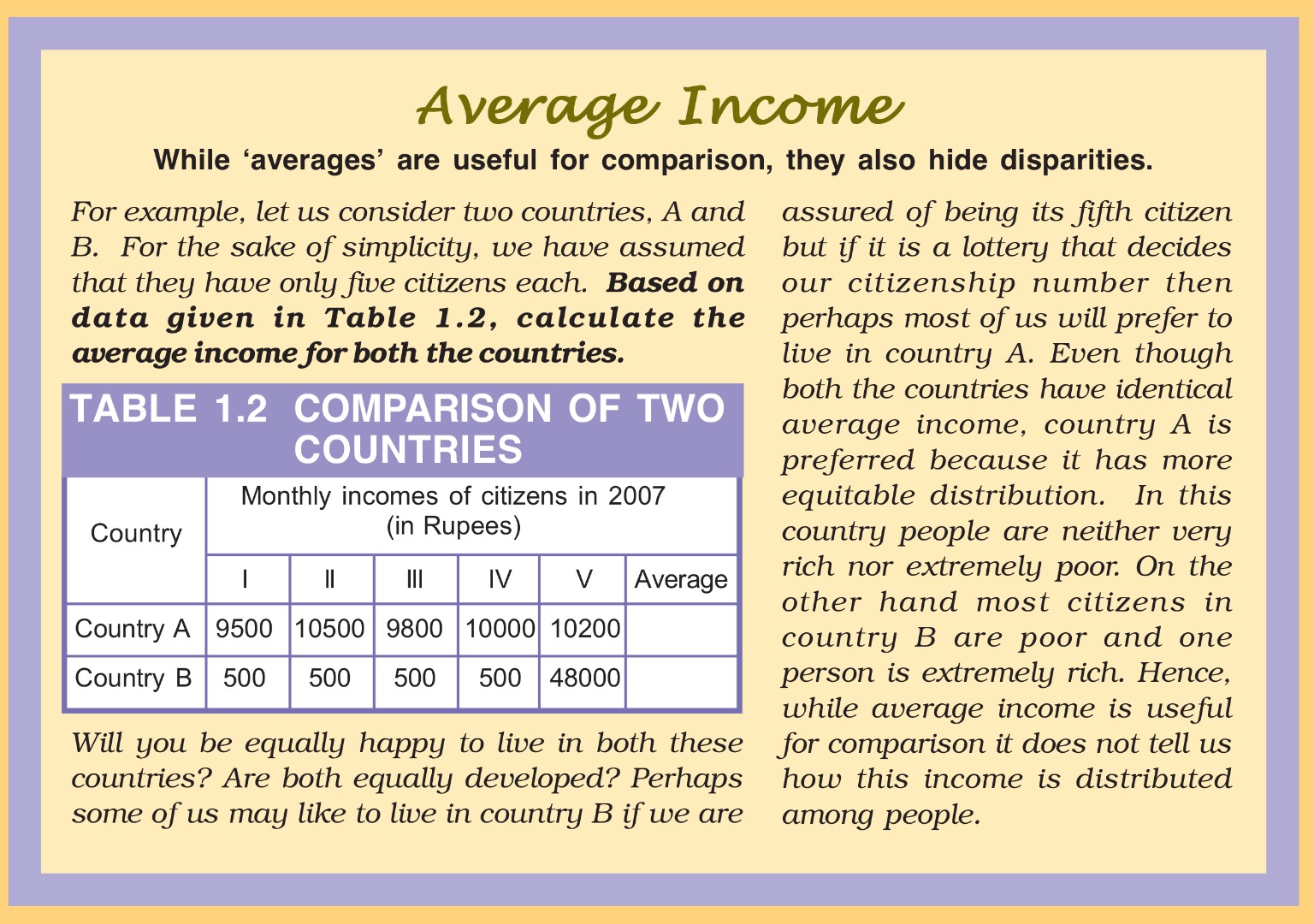- Economic development can be measured and income is the most common method for measuring development. However, the income method, though useful, has several weaknesses. Hence, we need newer ways of looking at development using indicators of quality of life and environmental sustainability.
- The idea of development or progress has always been with us. We have aspirations or desires about what we would like to do and how we would like to live.
- Similarly, we have ideas about what a country should be like. What are the essential things that we require? Can life be better for all? How should people live together? Can there be more equality?
- Development involves thinking about these questions and about the ways in which we can work towards achieving these goals.
- different persons can have different developmental goals and what may be development for one may not be development for the other. It may even be destructive for the other.
- Besides seeking more income, one- way or the other, people also seek things like equal treatment, freedom, security, and respect of others. They resent discrimination.
- All these are important goals. In fact, in some cases, these may be more important than more income or more consumption because material goods are not all that you need to live.
- Money, or material things that one can buy with it, is one factor on which our life depends. But the quality of our life also depends on non-material things mentioned above. If it is not obvious to you, then just think of the role of your friends in your life. You may desire their friendship. Similarly, there are many things that are not easily measured but they mean a lot to our lives. These are often ignored.However, it will be wrong to conclude that what cannot be measured is not important.
- Consider another example. If you get a job in a far off place, before accepting it you would try to consider many factors, apart from income, such as facilities for your family, working atmosphere, or opportunity to learn. In another case, a job may give you less pay but may offer regular employment that enhances your sense of security. Another job, however, may offer high pay but no job security and also leave no time for your family. This will reduce your sense of security and freedom. Similarly, for development, people look at a mix of goals.
- It is true that if women are engaged in paid work, their dignity in the household and society increases. However, it is also the case that if there is respect for women there would be more sharing of housework and a greater acceptance of women working outside. A safe and secure environment may allow more women to take up a variety of jobs or run a business.
- Hence, the developmental goals that people have are not only about better income but also about other important things in life.
- It is very important to keep in mind that different persons could have different as well as conflicting notions of a country’s development.
- However, can all the ideas be considered equally important? Or, if there are conflicts how does one decide? What would be a fair and just path for all? We also have to think whether there is a better way of doing things. Would the idea benefit a large number of people or only a small group? National development means thinking about these questions.
How to compare different countries and states:
- For comparing countries, their income is considered to be one of the most important attributes.
- Countries with higher income are more developed than others with less income. This is based on the understanding that more income means more of all things that human beings need.
- Whatever people like, and should have, they will be able to get with greater income. So, greater income itself is considered to be one important goal.
- Now, what is the income of a country? Intuitively, the income of the country is the income of all the residents of the country. This gives us the total income of the country.
- However, for comparison between countries, total income is not such an useful measure. Since, countries have different populations, comparing total income will not tell us what an average person is likely to earn.
- Are people in one country better off than others in a different country? Hence, we compare the average income which is the total income of the country divided by its total population. The average income is also called per capita income.
- In World Development Report 2006, brought out by the World Bank, this criterion is used in classifying countries.
- Countries with per capita income of Rs 4,53,000 per annum and above in 2004, are called rich countries and
- those with per capita income of Rs 37,000 or less are called low-income countries. India comes in the category of low-income countries because its per capita income in 2004 was just Rs 28,000 per annum. The rich countries, excluding countries of Middle East and certain other small countries, are generally called developed countries.

HUMAN DEVELOPMENT REPORT
Once it is realised that even though the level of income is important, yet it is an inadequate measure of the level of development, we begin to think of other criterion.
There could be a long list of such criterion but then it would not be so useful. What we need is a small number of the most important things.
Health and education indicators are among them. Over the past decade or so, health and education indicators have come to be widely used along with income as a measure of development.
For instance, Human Development Report published by UNDP compares countries based on the educational levels of the people, their health status and per capita income.
Sustainable development
- Whichever way we define development, suppose for the present that a particular country is quite developed. We would certainly like this level of development to go up further or at least be maintained for future generations.
- This is obviously desirable. However, since the second half of the twentieth century, a number of scientists have been warning that the present type, and levels, of development are not sustainable.
- Groundwater in India “Recent evidence suggests that the groundwater is under serious threat of overuse in many parts of the country. About 300 districts have reported a water level decline of over 4 metres during the past 20 years. Nearly one-third of the country is overusing their groundwater reserves. In another 25 years, 60 per cent of the country would be doing the same if the present way of using this resource continues. Groundwater overuse is particularly found in the agriculturally prosperous regions of Punjab and Western U.P., hard rock plateau areas of central and south India, some coastal areas and the rapidly growing urban settlements.”
- Groundwater is an example of renewable resources. These resources are replenished by nature as in the case of crops and plants. However, even these resources may be overused. For example, in the case of groundwater, if we use more than what is being replenished by rain then we would be overusing this resource.
- Non-renewable resources are those which will get exhausted after years of use. We have a fixed stock on earth which cannot be replenished. We do discover new resources that we did not know of earlier. New sources in this way add to the stock. However, over time, even this will get exhausted.
- More important, 43 years the stock of crude oil will last if people continue to extract it at the present rate. This is for the world as a whole. However, different countries face different situations. Countries like India depend on importing oil from abroad because they do not have enough stocks of their own. If prices of oil increase this becomes a burden for everyone. There are countries like USA which have low reserves and hence want to secure oil through military or economic power.
- Consequences of environmental degradation do not respect national or state boundaries; this issue is no longer region or nation specific. Our future is linked together.
- Sustainability of development is comparatively a new area of knowledge in which scientists, economists, philosophers and other social scientists are working together. In general, the question of development or progress is perennial. At all times as a member of society and as individuals we need to ask where we want to go, what we wish to become and what our goals are. So the debate on development continues.









